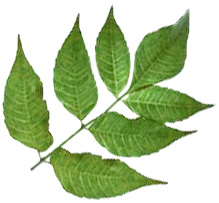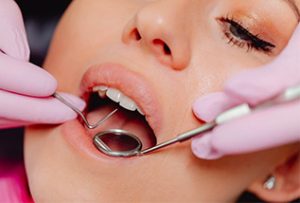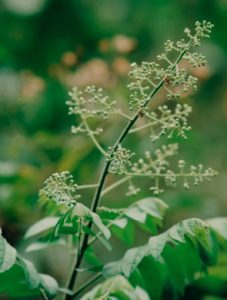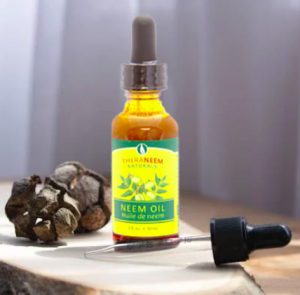Neem: The Village Pharmacy
In our last newsletter we examined boswellia, one of the herbs used for thousands of years by multiple civilizations. One of that herb’s compatriots is the focus of this article. Nicknamed “the village pharmacy” due to its numerous uses, neem is a cornerstone of Ayurveda, and has been used for nearly 4,500 years in India and surrounding areas. The list of medicinal properties attributed to this herb is vast: anti-inflammatory, anti-arthritic, antipyretic (fever), anti-fungal, anti-bacterial, anti-viral, anti-tumor, antihistamine, anti-fertility, anti-carcinogenic. It has applications for periodontal and skin health, and is a famous insecticide.

What Is It?
Native to India, although it grows in many Asian countries, neem (Azadirachta indica), is in the mahogany family and thrives in poor, arid soil. It has been useful for reforesting nations in West Africa and the Caribbean due to this ability. Native south Asian people have used the roots, bark, gum, fruit, leaves, seed kernels and seed oil from the neem tree to treat various illnesses for millenia.
Preventive Aid
Research has shown neem to possess strong antipyretic activity and traditionally it has been used to reduce fevers. One famous study using a crude neem extract rich in a novel compound, nimbidin, outperformed aspirin in reducing fever for a three-hour period. Neem preparations have shown pronounced anti-bacterial activity against various microorganisms. The blood-purifying properties of neem have been widely studied. One Indian analysis of 36 plants attributed with blood-purifying activity showed neem to have the widest range of beneficial effects. Neem leaf extracts have been found to protect the liver from damage when exposed to toxic agents. It appears to raise levels of glutathione, thereby offering hepatic protection. Neem (especially neem bark) has been found to contain immunomodulatory polysaccharide compounds. They appear to increase antibody production. Water-soluble neem extracts, taken orally, produced an increase in both white and red blood cells as well as an increase in lymphocytes.
 Oral Health
Oral Health
In its native India, neem is justly famous for improving many facets of oral health. Many people there chew neem twigs as nature’s toothbrush. Neem-based dental products have anti-plaque and anti-bacterial properties. In one clinical study, 50 patients with gum disease (gingivitis), severe bleeding and pustular discharges from the gums were given toothpaste with neem extract. In only three weeks of brushing twice a day, 80 percent experienced significant improvements with a 50 percent reduction in bacterial populations and elimination of bad breath problems.
Insecticidal Properties & More
 Neem is a proven insect repellent without the toxicity of DEET (diethyltoluamide). In a study at the Malaria Research Center (Field Station) in Jabalpur, India, a field study was undertaken to assess the mosquito repellent action of neem. Results revealed 81 to 91 percent protection from the bites of Anopheles mosquitoes during a 12-hour observation period, using various concentrations of neem oil mixed in coconut oil on exposed areas of skin of human volunteers. The application of neem was therefore deemed safe when used as a protection from malaria in endemic countries.
Neem is a proven insect repellent without the toxicity of DEET (diethyltoluamide). In a study at the Malaria Research Center (Field Station) in Jabalpur, India, a field study was undertaken to assess the mosquito repellent action of neem. Results revealed 81 to 91 percent protection from the bites of Anopheles mosquitoes during a 12-hour observation period, using various concentrations of neem oil mixed in coconut oil on exposed areas of skin of human volunteers. The application of neem was therefore deemed safe when used as a protection from malaria in endemic countries.
Neem is effective against insects in other ways. The oil is so unattractive that most insects won’t eat a plant treated with it. The oil if ingested by insects disrupts their hormones, eventually resulting in death. It is harmless to humans, however, making it an effective natural pesticide for plants. Neem extracts have been shown to act against more than 200 arthropod pests, including Mediterranean fruit flies, houseflies, fleas, head lice, Gypsy moths, boll weevils, and cockroaches.
One of the most highly contagious and difficult to eradicate skin diseases is caused by the scabies mite (Sarcopetes scabies). Studies using neem lotions found scabies to be effectively cured in just three days. Up to 97% of 800 sufferers had success using neem extract in lotion or ground neem and turmeric as a paste on the skin. Treatments with benzyl benzoate and sulpha drugs had failed to cure these same patients.
What We Have For You
Evergreen Nutrition and Wellness Center stocks multiple neem products, ranging from capsules to neem oil and oral care to skin care.

Back to Blog